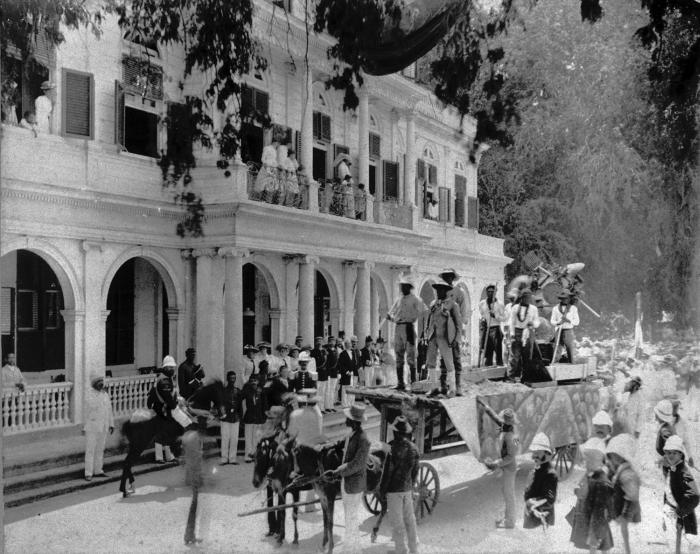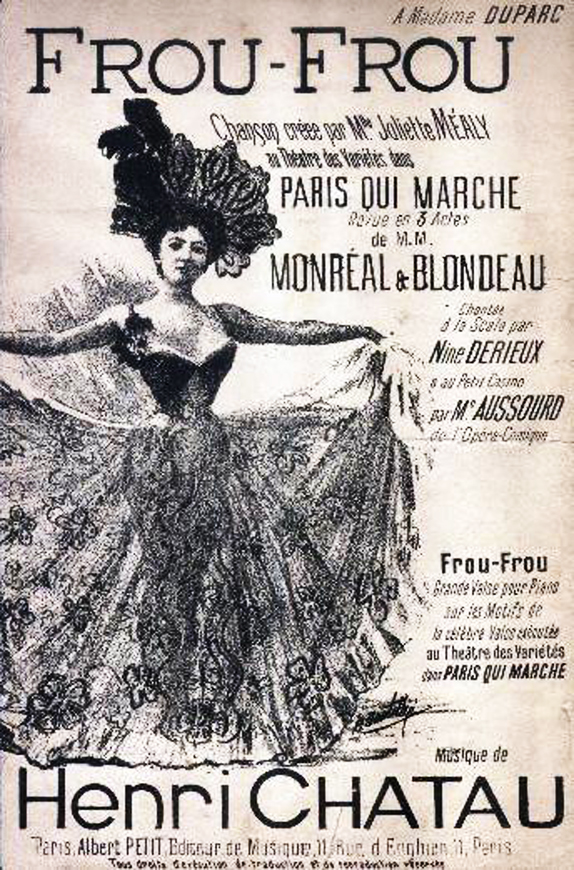|
Léon Jonathan
Léon Jonathan was a 19th-century French playwright and chansonnier. Biography His plays were presented at the Théâtre Beaumarchais and the Théâtre du Château-d'Eau. He met great success with his plays ''Pierre Vaux, l'instituteur'' ''Revue d'art dramatique'', vol.31-32, 1884, (p. 365) and ''Carnot'', a 5-act drama given on the stage of the Théâtre de l'Ambigu in 1884. Then no further mention of him is known. It is possible, judging by the contentious parts of his plays that the name was a non yet elucidated pseudonym. Works *1880 ''Le Ménétrier de Meudon'', opéra comique in 3 acts, with Gaston Marot, music by Germain Laurens *1881: ''La Convention nationale'', drama in 6 acts and 8 tableaux *1882: ''Pierre Vaux, l'instituteur'', drama in 5 acts and 7 tableaux, with Louis Péricaud *1884: ''Déjeuner du jour de l'an'', comédie en vaudeville in 1 act, with Charles Desmarest *1884: ''Carnot'', drama in 5 acts, with Henri Blondeau Henri Marie Gabriel Blondeau ... [...More Info...] [...Related Items...] OR: [Wikipedia] [Google] [Baidu] |
Chansonnier (singer)
A ''chansonnier'' (female: ''chansonnière'') was a poet songwriter, a solitary singer, who sang his or her own songs (''chansons'') with a guitar, prominent in francophone countries during the 1960s and 1970s. Unlike popular singers, ''chansonniers'' need no artifice to sing their soul poetry. They performed in "''Les Boites à Chansons''" which flourished during those years. The themes of their songs varied but included nature, love, simplicity and a social interest to improve their world. Canada In Canada, the ''chansonnier'' tradition played a prominent role in the development of Quebec's social and political awareness during the Quiet Revolution, (''la Révolution tranquille'') that led to the affirmation of Quebecers' national identity. One prominent ''chansonnier'', Robert Charlebois, transformed the province's musical culture when he moved from traditional ''chansonnier'' pop to a more rock-oriented sound with his fourth album, ''Lindberg'', in 1968.Bob Mersereau, ''The His ... [...More Info...] [...Related Items...] OR: [Wikipedia] [Google] [Baidu] |
Play (theatre)
A play is a work of drama, usually consisting mostly of dialogue between characters and intended for theatrical performance rather than just reading. The writer of a play is called a playwright. Plays are performed at a variety of levels, from London's West End and Broadway in New York City – which are the highest level of commercial theatre in the English-speaking world – to regional theatre, to community theatre, as well as university or school productions. A stage play is a play performed and written to be performed on stage rather than broadcast or made into a movie. Stage plays are those performed on any stage before an audience. There are rare dramatists, notably George Bernard Shaw, who have had little preference as to whether their plays were performed or read. The term "play" can refer to both the written texts of playwrights and to their complete theatrical performance. Comedy Comedies are plays which are designed to be humorous. Comedies are often filled ... [...More Info...] [...Related Items...] OR: [Wikipedia] [Google] [Baidu] |
Alhambra (Paris)
The Alhambra is a theatre which opened in April 2008 at 21, rue Yves-Toudic in the 10th arrondissement of Paris, 300 meters from the site of the old Alhambra-Maurice Chevalier. History The Alhambra occupies a building originally opened in 1920 by the Paris Fraternal Railway Association as a 600-seat theatre called the Théâtre Art Déco des Cheminots (Art Deco Theatre of the Railways). The elaborate furnishings included beautiful mahogany doors, geometric chandeliers, and stucco pillars — surmounted all by a bas-relief of a locomotive. The theatre, which had never been legally recognized as a theater by the Paris authorities, was converted to a commercial building in 1933,Alhambra: Description (in French) but it still contained a drive-in theater reserved for railway workers. Unfortunate ... [...More Info...] [...Related Items...] OR: [Wikipedia] [Google] [Baidu] |
Pseudonym
A pseudonym (; ) or alias () is a fictitious name that a person or group assumes for a particular purpose, which differs from their original or true name (orthonym). This also differs from a new name that entirely or legally replaces an individual's own. Many pseudonym holders use pseudonyms because they wish to remain anonymous, but anonymity is difficult to achieve and often fraught with legal issues. Scope Pseudonyms include stage names, user names, ring names, pen names, aliases, superhero or villain identities and code names, gamer identifications, and regnal names of emperors, popes, and other monarchs. In some cases, it may also include nicknames. Historically, they have sometimes taken the form of anagrams, Graecisms, and Latinisations. Pseudonyms should not be confused with new names that replace old ones and become the individual's full-time name. Pseudonyms are "part-time" names, used only in certain contexts – to provide a more clear-cut separation between o ... [...More Info...] [...Related Items...] OR: [Wikipedia] [Google] [Baidu] |
Opéra Comique
''Opéra comique'' (; plural: ''opéras comiques'') is a genre of French opera that contains spoken dialogue and arias. It emerged from the popular '' opéras comiques en vaudevilles'' of the Fair Theatres of St Germain and St Laurent (and to a lesser extent the Comédie-Italienne),M. Elizabeth C. Bartlet and Richard Langham Smith"Opéra comique" '' Grove Music Online''. Oxford Music Online. 19 November 2009 which combined existing popular tunes with spoken sections. Associated with the Paris theatre of the same name, ''opéra comique'' is not necessarily comical or shallow in nature; '' Carmen'', perhaps the most famous ''opéra comique'', is a tragedy. Use of the term The term ''opéra comique'' is complex in meaning and cannot simply be translated as "comic opera". The genre originated in the early 18th century with humorous and satirical plays performed at the theatres of the Paris fairs which contained songs ('' vaudevilles''), with new words set to already existing music. ... [...More Info...] [...Related Items...] OR: [Wikipedia] [Google] [Baidu] |
Tableau Vivant
A (; often shortened to ; plural: ), French language, French for "living picture", is a static scene containing one or more actors or models. They are stationary and silent, usually in costume, carefully posed, with props and/or scenery, and may be Theatre, theatrically lit. It thus combines aspects of theatre and the visual arts. A tableau may either be 'performed' live, or depicted in painting, photography and sculpture, such as in many works of the Romanticism, Romantic, Aestheticism, Aesthetic, Symbolism (arts), Symbolist, Pre-Raphaelite, and Art Nouveau movements. In the late 19th and early 20th centuries, tableaux sometimes featured ('flexible poses') by virtually nude models, providing a form of Erotica, erotic entertainment, both on stage and in print. Tableaux continue to the present day in the form of living statues, street performers who busk by posing in costume. Origin Occasionally, a Mass (liturgy), Mass was punctuated with short dramatic scenes and paintin ... [...More Info...] [...Related Items...] OR: [Wikipedia] [Google] [Baidu] |
Louis Péricaud
Louis Jean Péricaud (10 June 1835, La Rochelle – 12 November 1909, Paris) was a 19th-century French stage actor, chansonnier, playwright, theatre historian and theatre director. He was the father of actress Berthe Jalabert (1858–c.1935) and the uncle of actor Gustave Hamilton (1871-1951). Works ;Selected plays: *1864: ''Le Diable au Havre'', grande revue-féerie in 4 acts and 5 tableaux, with Richard Lesclide, Théâtre du Havre, 13 January *1873: ''À cache-cache'' comedy in one act in verse and in prose, with Carle Le Dhuy, Théâtre du Vaudeville, 25 July *1876: ''Les Trois grâces'', pochade musicale, with Lucien Delormel and Gaston Villemer, Alcazar d'Été *1877: ''La Jeunesse de Béranger'', one-act operetta, music by Firmin Bernicat, L'Eldorado, 20 January *1878: ''Une aventure de Clairon'', one-act operetta, with Gaston Villemer, L'Eldorado, 23 November *1881: ''Les Chevau-Légers'', one-act operetta, with Lucien Delormel, music by Robert Planquette, L'Eldorado ... [...More Info...] [...Related Items...] OR: [Wikipedia] [Google] [Baidu] |
Henri Blondeau
Henri Marie Gabriel Blondeau (5 August 1841 – 4 May 1925) was a French playwright, librettist and Chansonnier (singer), chansonnier, famous for his song ''Frou-frou (song), Frou-frou''. Biography A clerk by a stockbroker, he became known in the early 1860s by his ditties in the cafés-concerts. With his friend Hector Monréal, they would collaborate during 40 years on the stages. His Play (theatre), plays were presented on the most significant Parisian stages of the 19th century including the Théâtre de l'Ambigu-Comique, Théâtre des Folies-Dramatiques, Théâtre des Variétés, Alhambra (Paris), Théâtre du Château d'Eau. In 1870, during the Paris Commune, and in association with Monréal, he ran a satirical newspaper called the ''Fils du Père Duchêne illustré''. Works * ''Ah ! J'aime bien mieux ça !'', chansonnette, music by Ernest Martin, 1863 * ''L'Embarras du choix !'', chansonnette, music by Martin, 1863 * ''Victoire et félicité !'', duo comique, mu ... [...More Info...] [...Related Items...] OR: [Wikipedia] [Google] [Baidu] |
William Busnach
William Bertrand Busnach (7 March 1832, Paris – 20 January 1907, Paris) was a French dramatist. Biography Busnach was a nephew of the composer Fromental Halévy. His father was associated with David Ben Joseph Coen Bakri, to whom France was indebted to the amount of some twenty-odd million francs for provisions furnished to Napoleon Bonaparte in Egypt. The lawsuit lasted for more than fifty years, and Busnach and his partner were not paid in full at the end. The elder Busnach, an Algerian Jew, became a naturalised Italian in the time of the Deys, and was the first interpreter of the French army. He established himself in Paris in 1835. William – an Italian Jew born in France of an Algerian father, with a German surname and an English given name – was at first employed in the customs department. He subsequently devoted himself to dramatic work, writing many plays, a number of which have been successful. They include: ''Les Virtuoses du Pavé'', 1864; ''Première Fraîcheu ... [...More Info...] [...Related Items...] OR: [Wikipedia] [Google] [Baidu] |
.jpg)




